Progressive Teacher Education Conference
Progressive Teacher Education: Defining, Sustaining, Transforming
Join with other educators in conversations and presentations on the future of the field of teacher education. Presenters include educators from Sarah Lawrence College’s Art of Teaching Program, Bank Street College of Education, and Antioch University New England integrated learning teacher certification programs.
How can the field of progressive teacher education maintain its integrity in the evolving educational landscape of the 21st century? The primary goal of this conference is to bring together teacher educators, professional developers, school and district leaders, and education advocates who believe in progressive educational values and experiential methods for the education of pre-service teachers. At the conference, participants will participate in workshops presented by prominent and experienced leaders in the field of progressive teacher education. Participants will engage in conversations with colleagues about new challenges facing teacher education programs and consider progressive solutions for teacher education today. Key educators will form a panel to discuss the challenges facing progressive education in K-12 public schools and make suggestions for ways to prepare new teachers for these challenges. The keynote speaker, Vanessa Rodriguez, is an exciting new voice in the field of teacher education.
Progressive Teacher Education: Defining, Sustaining, and Transforming will offer an opportunity for teacher educators and school leaders to reconnect with their educational values, and to explore ways to continue to act from these values in the changing culture of American education.
Keynote: Developing Teacher Awareness, Vanessa Rodriguez
“Teaching is a dynamic process of sensing, processing, and responding. It’s a natural human endeavor [and] . . . a human cognitive skill that develops over the course of our lifespan. [At] the heart of it all, teaching is neither an independent act nor merely a tool. It is an interaction between a learner (or many learners) and a teacher.” (p. 177; The Teaching Brain: An Evolutionary Trait at the Heart of Education)
In this keynote, Vanessa Rodriguez will introduce five teacher awarenesses — awareness of self, awareness of teaching practice, awareness of interaction, awareness context, and awareness of learner — that are critical to successful teaching-learning interactions. Rodriguez advocates that these multiple awarenesses as essential to the development of teachers, and need to be an integral part of teacher education. She challenges purely behaviorist or child-centered approaches to teaching-learning interactions and calls upon teachers to look beyond their responses to learners and consider their personal and professional processes contributing to those responses. Rodriguez states,
” . . . rather than focusing so much attention on the teaching response alone, the more deeply we understand a teacher’s processing, the greater the benefit to everyone who is part of the interaction. Going back one step further is not just helpful or good, but necessary; it is in the processing that teachers make decisions about how to respond. If we hope to positively affect the responses of teachers, the key is in adjusting the processing. A response-only approach enters the interaction too late to create any real change.” (p.127; The Teaching Brain: An Evolutionary Trait at the Heart of Education)
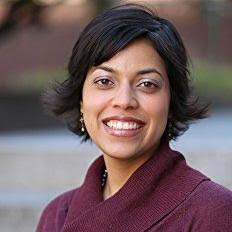
Vanessa Rodriguez
Vanessa Rodriguez, Ed.D. is Assistant Professor in the Center for Early Childhood Health and Development within the Department of Population at NYU School of Medicine. Vanessa taught middle-school humanities in the New York City public schools for more than ten years before completing her doctorate in Human Development and Education at Harvard. She is motivated by contributing to the science of teachers as learners. Dr. Rodriguez is a teacher and researcher focused on expanding our understanding of the cognitive development of teachers using a dynamic skills framework. She explores the social emotional cognitive competencies underlying teaching to create new models and tools for measuring this skill development. She utilizes mixed methods including cognitive interviews, surveys and psychophysiologic approaches to explore a skill scale for how teachers understand their own development and how it evolves throughout their career. In addition to her academic publications, Rodriguez wrote “The Teaching Brain” in which she married her extensive teaching experiences with novel research literature to put forth a new vision for the future of teaching.
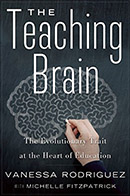 “What a fascinating idea . . . [a] challenging and inspiring work. Vanessa Rodriguez has a truly original mind. Her experience, empathy, and insight have inspired and provoked me.” —Deborah Meier, author of In Schools We Trust
“What a fascinating idea . . . [a] challenging and inspiring work. Vanessa Rodriguez has a truly original mind. Her experience, empathy, and insight have inspired and provoked me.” —Deborah Meier, author of In Schools We Trust
Schedule
8:30 – 9:00 Registration and refreshments
9:00 – 10:45 Keynote: Vanessa Rodriguez – Developing Teacher Awareness
10:45 – 11:00 Break
11:00 – 12:30 Session One: Defining
Models of Classic Progressive Teacher Education Instruction; Presenters engage participants in hand-on, experiential teacher education practices.
Workshop I: The Essential Role of Neighborhood Trips in Teacher Preparation Programs
Simple excursions into one’s immediate neighborhood can spark the imagination, raise questions and fuel the desire to explore, discover and figure things out. Neighborhood trips are a valuable part of school programs for children, and they’re essential for teacher education programs as well. In this workshop, we’ll share stories of trips that vitalized our own teaching and learning, then venture out to investigate our surroundings. We’ll consider how purposeful, well-planned fieldwork can provoke a teacher’s curiosity, deepen understanding of the world around, link teachers, students and the community and enrich a teacher education curriculum.
Carol Berner, Smith College Department of Education and Child Study, Regional Coordinator, River of Words.
Ellen Doris, Core Faculty, Antioch University New England.
Workshop II: Place-based Teacher Education
Over the past decade, we’ve place-ified the teacher education program at Antioch New England. Why have we done this, what does it look like and how has it been translated onto campuses around the country? Some theory, some practice, some actual doing.
David Sobel, Senior Faculty Education Department at Antioch University New England and founder Integrated Learning Program.
Workshop III: Messing About in Science and Art
Taking the lead from David Hawkin’s article, “Messing About in Science,” participants will mess about (play) with an array of art and science materials, reflect on the experience, and make connections to their work with students.
Kathleen Ruen, Acting Director, Art of Teaching Program at Sarah Lawrence College
Patricia Virella, Adjunct Professor, Art of Teaching Program at Sarah Lawrence College
Read article “Messing About in Science” by David Hawkins
12:30 – 1:30 Lunch
1:30 – 2:45 Session Two: Transforming
In Session II groups, participants will identify key and non-negotiable values of progressive teacher preparation programs. They will consider the realities of current students in teacher education programs, and consider ways to develop teacher education programs that sustain critical values while supporting the needs of students today. We will attempt to answer the question: What does progressive education and teacher education look like today?
Group I: Facilitated by Susan Dreyer-Leon and Laura Thomas of Antioch New England Education Department
Group II: Facilitated by Nancy McKeever and Katy O’Donnell of Bank Street College of Education
Group III: Facilitated by Patricia Virella of Sarah Lawrence College Art of Teaching Program
2:45 – 3:00 Break
3:00 – 4:00 Panel Discussion: Sustaining
Teacher educators and school leaders form a panel to discuss the challenges facing progressive education in K-12 public schools and make suggestions for ways to prepare new teachers for these challenges.
Kim Carter, Executive Director of the QED Foundation.
Susan Rauchwerk Co-Director of the Science in Education professional licensure program at Lesley University, and Co-Director of WonderLab, and 21st century STEAM-based lab school.
Carol Rodgers, Associate Professor of Education at SUNY Albany.
Kathleen Ruen, Acting Director of the Sarah Lawrence College Graduate Art of Teaching Program.
Steve Tuller, Principal at East Kingston Elementary School, East Kingston, NH.
Heidi Watts, Professor Emerita from Antioch University New England, formerly Co-Chair of the Department of Education and Integrated Learning Program.
4:00 – 4:15 Break
4:15 – 4:40 Closing Conversations: Participants debrief with one another
Conference Presenters
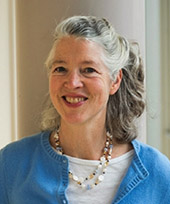
Carol Berner is a Lecturer at Smith College in the departments of Education and Child Study and Landscape Studies. Her career includes working with K–12 students and teachers as a classroom teacher, faculty coach and curriculum designer, in addition to serving on the graduate faculties of Bank Street College of Education and Antioch University New England. Her work explores inquiry-based teaching and learning, environmental education, and arts integration. She is regional coordinator of River of Words, a place-based education initiative promoting environmental literacy through the arts, and founding director of Water Inquiry, a collaborative professional development project working to improve children’s understanding of water through interactive stories and schoolyard investigations.

Carol Rodgers is an associate professor of education at the University at SUNY Albany. Her work focuses on reflective practice, the philosophy of John Dewey, presence in teaching, and the theory and practice of a humanizing pedagogy. Publications include “Presence in teaching,” Teachers and Teaching: Theory and Practice (2006), with Miriam Raider-Roth), and “Defining Reflection,” Teachers College Record (2002), and “A humanizing pedagogy: Getting beneath the rhetoric,” in Perspectives in Education (2012), a South African journal.
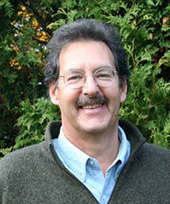
David Sobel is Senior Faculty in the Education Department at Antioch University New England in Keene, NH and he consults and speaks widely on child development and place-based education. He has authored eight books and more than 70 articles focused on children and nature for educators, parents, environmentalists and school administrators in the last 30 years. His most recent book is Nature Preschools and Forest Kindergartens: The Handbook for Outdoors Learning published by Redleaf Press.
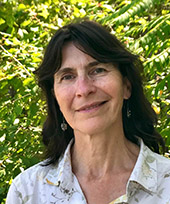
Ellen Doris, EdD, Core Faculty in the Department of Education at Antioch University New England. She is an early childhood and elementary school teacher and administrator; museum and outdoor educator; professional development provider and consultant; author of Doing What Scientists Do: Children Learn to Investigate Their World, Life at the Top: Studies in a Tropical Forest Canopy, and the Real Kids/Real Science series. Professional interests include place-based teaching and learning, descriptive inquiry, and the history of nature study and science education.

Ellen Schwartz taught primary grades in Vermont and Massachusetts for thirty years, prior to which she taught in a bilingual cluster program in Boston, directed a school-based youth center in England, taught English in the former Yugoslavia, and worked as a typesetter. She is the co-editor of Making Space for Active Learning: The Art and Practice of Teaching, a collection of stories and essays by teachers about building on children’s interests, experiences, and questions and incorporating inquiry into teaching practice. Ellen had a long association with the former Prospect Center and Archives, through participating in and presenting at Prospect’s Summer Institutes and Fall and Spring Conferences. She is a member of a study group that uses Prospect’s descriptive methodology to conduct inquiries into children, learning and teaching, and serves as a mentor to Practitioner Fellows in the Prospect Archives Fellowship Program at the University of Vermont.
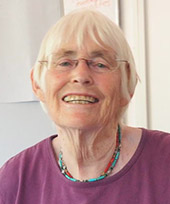
Heidi Watts, PhD, is professor emerita from AUNE, formerly co-chair of the Department of Education, and currently working with the Doctoral Program in Environmental Studies. She follows a migratory pattern, living in Nova Scotia in the summer, New Hampshire in the fall and spring, and India in the winter, where she works with teachers in the international community of Auroville.
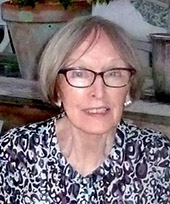
Katherine O’Donnell was a long time faculty member in the Teacher Education and Educational Leadership Departments at Bank Street College. She taught courses in the Teaching of Reading, Adult Development, Processes of Supervision and Research in Education. and was a program director and department chair . She did research on stages of teacher development , the effect of teacher-child verbal interaction on children’s cognitive growth. She grew up in Poughkeepsie, New York and studied at S.U.N.Y. College at Buffalo, U.of Minnesota and Teachers’ College, Columbia University.
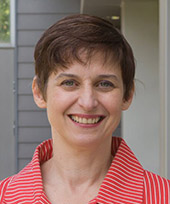
Kathleen Ruen, B.A. ’92, M.S.Ed. ’93, is a graduate of the Art of Teaching Program at Sarah Lawrence College, where she is currently the Acting Director. She worked as a teacher in several public elementary schools in Manhattan, and developed and taught a Movement/Theater program at Central Park East I Elementary School in East Harlem for 8 years. Kathleen received her doctorate from New York University. Her thesis was a qualitative study of 3 artists working with children in an elementary school, which, through interviews and observation, looked for connections between teaching, research and making art. Kathleen started teaching in the Art of Teaching Program in 2004 and became the Associate Director in the spring of 2014. Kathleen’s interests are arts education, curriculum development, culturally relevant teaching, children’s rights, and the relationship between the school and the community. Kathleen has presented at international, national and regional conferences, is a member of Kappa Delta Pi, and a recipient of a five-year Annenberg Arts Grant, two New York State Water Resources Institute (WRI) research grants, and most recently the Teacher Opportunity Corps II grant, which falls under the National and New York State My Brother’s Keeper Initiative.
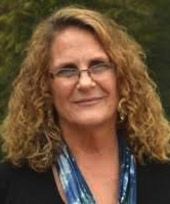
Kim Carter is the Executive Director of the Q.E.D. Foundation, an organization of adults and youth working together to create and sustain student-centered learning communities. The 1991 New Hampshire Teacher of the Year and 1996 New Hampshire Media Educator of the Year, Kim is passionate about democratic schooling, educational equity, and learning theory, and has decades of expertise in developing adult and youth capacities for co-constructing learning experiences inside and outside of school. She serves on the NHASCD Executive Board, is a long-time Coalition of Essential Schools affiliate, and contributes to the Education Reimagined collaborative community. Kim has developed and applied her expertise designing and implementing educational programs and schools that elevate and authorize students as partners in the learning process, including Souhegan High School, Making Community Connections Charter School (MC2 School), New Hampshire and Rhode Island’s Extended Learning Opportunity Pilot programs and Asia Society’s International Studies Schools Network.
Laura Thomas, MEd (@CriticalSkills1), is Teaching Faculty at Antioch University New England. Her research is on the educational technology and the Critical Skills Classroom (problem-based, experiential, and social-emotional learning) with a particular emphasis on the social justice implications of both. In addition to directing the Antioch Center for School Renewal, she is a community facilitator and blogger for Edutopia, an active school coach and staff developer, conducting workshops and institutes nationally on the subjects of school change, resistance, assessment, experiential learning, and the creation of collaborative learning communities, among other topics.
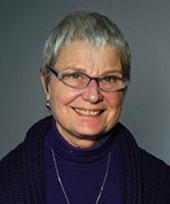
Nancy McKeever began teaching kindergarten immediately after graduating from Cornell University in Child Development. She later went on to teach Head Start and then to teach at Yale Child Study Center. Research in the social sciences and her work in Descriptive Review inform her practice. She has a deep commitment to the role of education in a democratic society.
Her work has included advisory services and workshop presentations in early childhood development and curriculum, documentation of the Connecticut Beginning Educator Support and Training Program, and work as an assessor of first-year teachers.
Joining the Bank Street faculty in 1992, she served in a variety of capacities, advisor/supervisor, instructor of Child Development, Observing and Recording, and Block Building, researcher, and administrator until 2016.
She received her M.S. from Bank Street College and her Ph.D. in Educational Research and Evaluation from The Union Institute where she wrote Actualizing the Dream to Teach: Case Studies of First-Year Teachers in Formal Mentoring Relationships.

Patricia Virella is an urban educator who has worked in the urban intensive setting for nearly a decade. Patricia has worked as a teacher, literacy coach, and most recently as a principal. In Fall 2017, Patricia will begin her PhD at the Neag School of Education at the University of Connecticut. She is a graduate, panelist and adjunct professor at Sarah Lawrence College’s Art of Teaching Program, instructing the course titled “Educating for Diversity.” She has recently presented at the 2016 National Girls School Conference, on the implementation of Interdisciplinary Framework in STEM, as well as participated in AERA 2017 as a discussant and peer reviewer. Her work in charter schools has led to increased outcomes for students as well as teacher retention.

Steve Tullar is the principal at East Kingston Elementary School in East Kingston, NH. He has been an elementary classroom teacher for 12 years including work at Stratham Memorial School and in the Oyster River School District. Tullar also served as the assistant principal of Auburn Village School for one year, and was the principal of the Westminster Schools in Vermont for ten years. At various times since 1993, he has taught college courses at UNH, Antioch New England University, and Keene State College. Steve earned his BA degree in sociology along with two M.Ed. degrees, one in Elementary Education and another in Supervision and Administration, from the University of New Hampshire.
Susan Dreyer-Leon, EdD, Director, Experienced Educators’ Program at Antioch University New England; former alternative public high school teachers/leaders in New York city and Vermont; School Reform Initiative National Facilitator; experienced Coalition of Essential Schools teacher and leader. Special interests include the development and support of equitable, democratic and joyful schools, mindfulness and education, facilitative leadership, and sustainable and place-based educational practices.

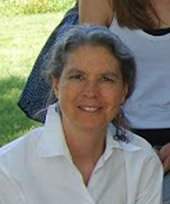
Teri Young, Ed.D., Conference Chairperson, Core Faculty and Director of Integrated Learning Program in the Department of Education at Antioch University New England. Teri’s career includes experience both as a K-12 teacher and as an administrator and educational consultant in New York City public schools. She has worked as a teacher and consultant in community-based programs for at-risk youth, and was the founding director of a small public high school in Brooklyn, NY. Teri served as an educational leadership consultant and speaker for the New York City and Bank Street College principals institutes. She also worked as an educational consultant and instructor for the Vermont Department of Education, and for Vermont and New Hampshire public schools. Her workshops and talks address authentic collaborative leadership, and the cultivation of democratic and inclusive school cultures.
Registration:
Registration includes admission to the conference, morning coffee and snacks, lunch, and certificate of attendance. Register Now
Fees:
Event fee $100
Student fee (undergraduate or graduate student at any school) $40
Antioch alumni fee $40
Cooperating Teachers (supervising Antioch interns) $40
Refunds:
Cancellations received in writing 14 days before the event will receive a full refund.
Cancellations received in writing 13 or less days in advance of the event of the event will receive a 50% refund.
Accommodations
Courtyard by Marriott Keene Downtown – hotel located in downtown Keene close to a variety of restaurants and shops. This hotel is located approximately 1 ¼ miles from the conference location.
Holiday Inn Express – Budget accommodations, Walking distance to the conference location is approximately three-quarters of a mile. A variety of fast food, restaurants, and movie theaters are located nearby.
Best Western Plus Keene – Suburban hotel, 1 mile from conference location, best for those with cars.


